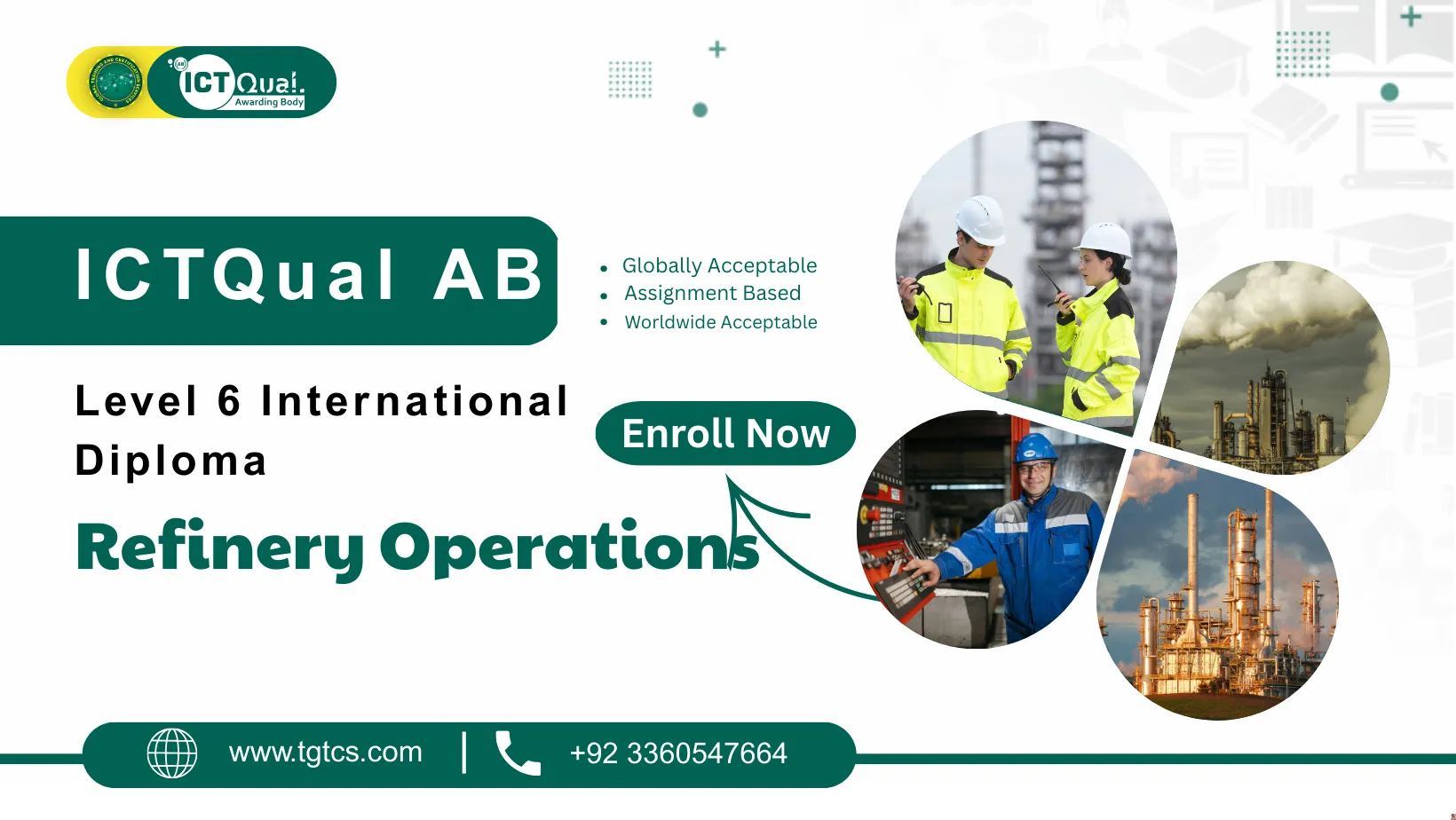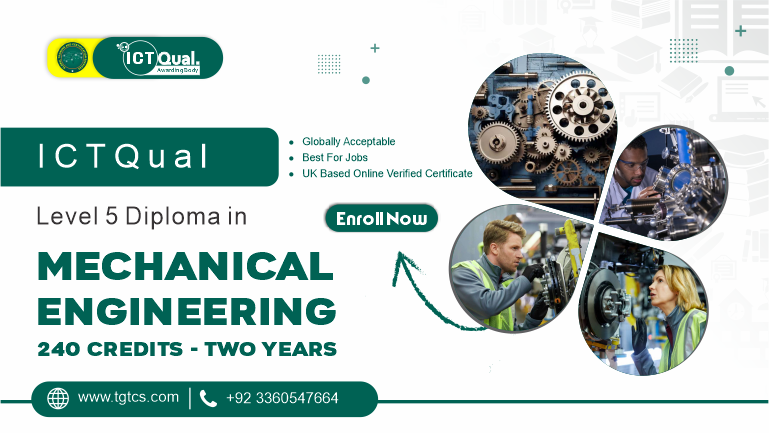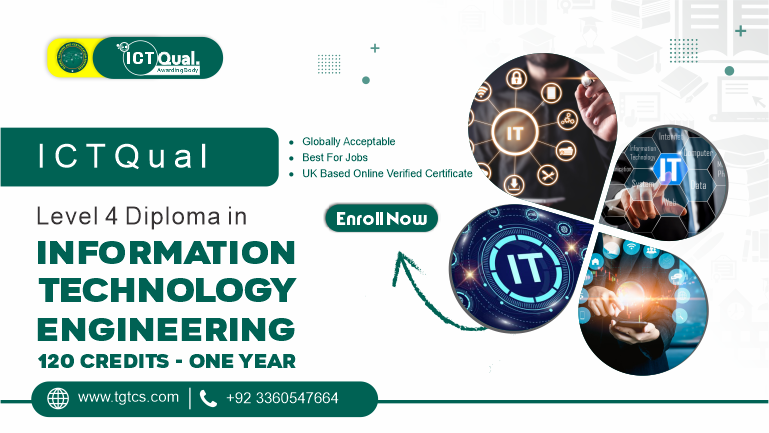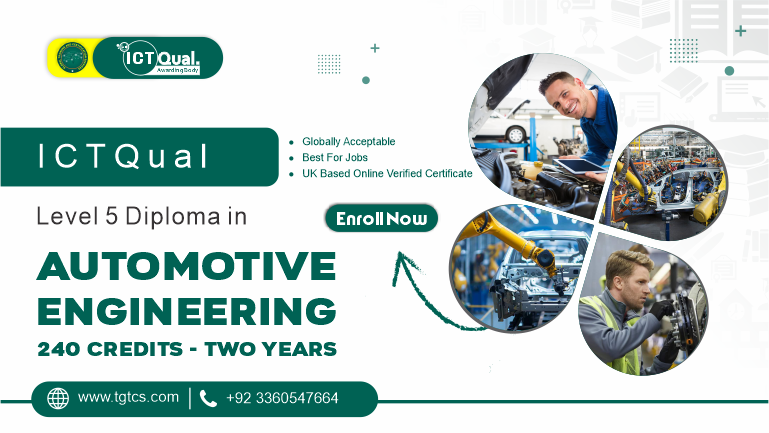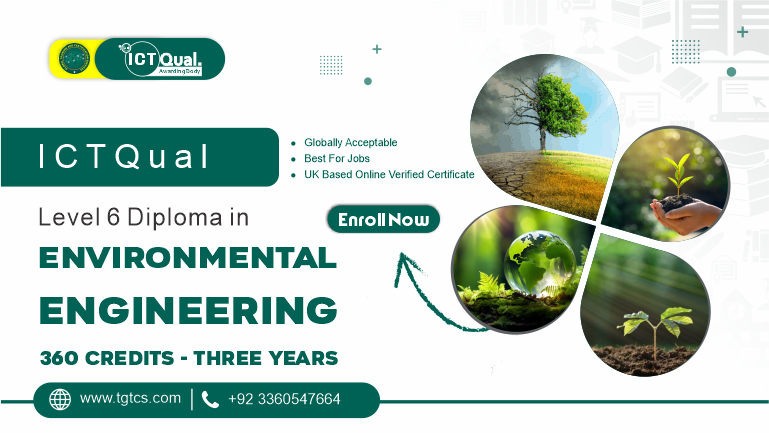ICTQual AB Level 6 International Diploma in Refinery Operations
The global energy sector relies heavily on efficient refinery operations to meet industrial and consumer demands, making expertise in refinery management and operations critically important. The ICTQual AB Level 6 International Diploma in Refinery Operations equips learners with advanced technical knowledge, operational skills, and strategic insights necessary for successful careers in oil and gas refineries worldwide.
This comprehensive program covers key aspects of refinery engineering, process optimization, plant safety, quality control, and operational management. Participants will gain practical experience in monitoring refinery processes, evaluating production efficiency, and implementing best practices for safety, compliance, and environmental management. The course also emphasizes modern tools and technologies used in refining operations, preparing learners to work effectively in both onshore and offshore facilities.
By completing this diploma, learners will develop essential skills in process engineering, energy management, risk assessment, and operational leadership. They will also acquire expertise in refinery planning, chemical processing, and quality assurance, enabling them to optimize production while maintaining strict adherence to safety and environmental regulations.
Graduates of this program are well-prepared for roles such as refinery operations engineer, process engineer, production supervisor, and plant manager. With British Council verifiable, MOFA and Embassy attestable certification, this qualification ensures international recognition and credibility, enhancing career prospects, job opportunities, and eligibility for Iqama approval.
The Global Training and Certification Services is Approved Training Centre of ICTQual AB UK Ltd
Start your career in the energy sector with the ICTQual AB Level 6 International Diploma in Refinery Operations, a globally recognized 360-credit qualification designed to equip learners with advanced technical knowledge, operational expertise, and leadership skills required for efficient refinery management and petroleum processing.
Flexible, Assignment-Based Learning
- Fully 360-credit program, entirely assignment-based for self-paced learning.
- Study from anywhere in the world, suitable for remote learners.
- Complete all 36 mandatory assignments within three years for fresh learners.
International Recognition
- British Council verifiable, ensuring global credibility.
- MOFA and Embassy attestable, ideal for official documentation.
- Highly valued for career advancement, job opportunities, and Iqama approval.
Suitable for Fresh Learners
- Build strong technical foundations in refinery operations, process engineering, and plant safety.
- Develop practical skills in production monitoring, quality control, and environmental management.
- Gain professional competence to enter the oil and gas industry with confidence.
Fast-Track Option for Experienced Professionals
- Submit verifiable evidence of at least six years of relevant work experience.
- Demonstrate knowledge in professional discussion meetings with an ICTQual AB Approved Assessor.
- Achieve certification without completing all mandatory assignments, saving time while validating prior expertise.
Career-Enhancing Skills
- Develop operational leadership, process optimization, and risk management skills.
- Prepare for senior roles such as refinery operations engineer, process engineer, production supervisor, and plant manager.
- Gain expertise in refinery planning, chemical processing, and safety compliance.
By completing the ICTQual AB Level 6 International Diploma in Refinery Operations, learners will be fully prepared to advance their careers, gain international recognition, and excel in the competitive global refinery and petroleum sector.
Mandatory Unit
This qualification, the ICTQual AB Level 6 International Diploma in Refinery Operations, consists of 36 mandatory units.
Year 1 – Foundation in Refinery Operations
- Principles of Chemical Engineering
- Introduction to Petroleum Refining
- Crude Oil Properties and Analysis
- Refinery Process Units Overview
- Distillation Principles and Applications
- Heat and Mass Transfer in Refining
- Introduction to Catalysts and Chemical Reactions
- Process Instrumentation and Control Basics
- Health, Safety, and Environmental Awareness
- Industrial Laboratory Techniques
- Technical Report Writing
- Introduction to Process Simulation Software
Year 2 – Intermediate Refinery Operations
- Advanced Distillation and Separation Techniques
- Hydrocracking and Hydrotreating Processes
- Fluid Catalytic Cracking (FCC) Operations
- Process Control and Automation in Refineries
- Energy Management and Efficiency in Refining
- Reactor Design and Optimisation
- Process Safety Management
- Refinery Production Planning
- Quality Control and Assurance in Refining
- Environmental Management and Sustainability
- Petroleum Product Blending Techniques
- Data Analysis and Technical Communication
Year 3 – Advanced Refinery Operations
- Advanced Process Optimisation and Troubleshooting
- Refinery Project Management
- Catalysts and Reaction Kinetics in Depth
- Advanced Process Simulation and Modelling
- Corrosion and Maintenance in Refineries
- Energy Transition and Cleaner Refining Technologies
- Risk Assessment and Hazard Analysis
- Advanced Laboratory Techniques and Process Testing
- Supply Chain and Logistics in Refining
- Capstone Project in Refinery Operations
- Professional Development and Leadership in Energy
- Strategic Decision-Making in Refinery Management
The ICTQual AB Level 6 International Diploma in Refinery Operations equips learners with advanced technical knowledge, practical skills, and strategic expertise to excel in modern petroleum refining, process engineering, and refinery management roles globally.
Year 1 – Foundation in Refinery Operations
Principles of Chemical Engineering
- Understand the fundamentals of chemical engineering and its application in refining.
- Analyze chemical processes and reactions in industrial settings.
- Apply basic engineering principles to problem-solving in refinery operations.
- Develop a foundation for advanced refinery process studies.
Introduction to Petroleum Refining
- Learn key refinery processes and operational workflows.
- Understand the conversion of crude oil into petroleum products.
- Explore refinery infrastructure and process unit functions.
- Gain awareness of industry standards and best practices.
Crude Oil Properties and Analysis
- Examine physical and chemical properties of crude oil.
- Understand laboratory methods for crude characterization.
- Analyze how crude quality affects refining processes.
- Apply knowledge in refinery planning and operations.
Refinery Process Units Overview
- Identify main refinery process units and their roles.
- Understand interactions between distillation, cracking, and treatment units.
- Learn operational parameters and control mechanisms.
- Develop the ability to monitor and evaluate refinery performance.
Distillation Principles and Applications
- Understand principles of fractional distillation in petroleum refining.
- Apply theoretical knowledge to design and operate distillation columns.
- Analyze separation efficiency and process optimization.
- Evaluate operational challenges and solutions in distillation processes.
Heat and Mass Transfer in Refining
- Learn key concepts of heat and mass transfer in refinery systems.
- Apply calculations to optimize energy and material efficiency.
- Understand transfer processes in reactors, exchangers, and separation units.
- Solve practical engineering problems using theoretical models.
Introduction to Catalysts and Chemical Reactions
- Understand catalyst types and reaction mechanisms in refining.
- Explore catalytic processes like hydrocracking and hydrotreating.
- Apply basic kinetics to optimize reaction conditions.
- Develop safety awareness in handling reactive chemicals.
Process Instrumentation and Control Basics
- Learn fundamentals of process monitoring and instrumentation.
- Understand control systems for temperature, pressure, and flow.
- Apply control strategies to maintain refinery efficiency.
- Analyze instrumentation data for operational decision-making.
Health, Safety, and Environmental Awareness
- Understand HSE regulations in refinery operations.
- Identify hazards and implement mitigation strategies.
- Promote sustainable practices in energy and process operations.
- Develop safety culture awareness for industrial settings.
Industrial Laboratory Techniques
- Apply laboratory techniques for crude and product analysis.
- Conduct experiments to understand chemical and physical properties.
- Ensure accuracy and reliability in laboratory data.
- Integrate lab findings into operational decision-making.
Technical Report Writing
- Develop clear and professional reporting skills.
- Communicate technical findings effectively to stakeholders.
- Apply structured formats for process and research reports.
- Present data and analysis in a concise, professional manner.
Introduction to Process Simulation Software
- Learn basic refinery simulation tools and software applications.
- Model refinery processes to predict operational performance.
- Analyze simulation outputs to optimize processes.
- Integrate software analysis into practical refinery decision-making.
Year 2 – Intermediate Refinery Operations
Advanced Distillation and Separation Techniques
- Apply advanced distillation methods for efficient product separation.
- Optimize separation processes using theoretical and practical knowledge.
- Understand multi-component systems and column design parameters.
- Analyze operational challenges and implement solutions for improved yield.
Hydrocracking and Hydrotreating Processes
- Learn catalytic processes for converting heavy hydrocarbons into lighter products.
- Understand hydrogenation, hydrodesulfurization, and process optimization.
- Monitor operational parameters to maximize efficiency and safety.
- Evaluate economic and environmental aspects of hydrocracking operations.
Fluid Catalytic Cracking (FCC) Operations
- Understand FCC unit design, operation, and catalyst management.
- Apply process control strategies for optimal product yield.
- Troubleshoot common operational issues in FCC units.
- Integrate FCC operations with refinery production planning.
Process Control and Automation in Refineries
- Learn automation technologies and control strategies in refining.
- Apply distributed control systems (DCS) for operational efficiency.
- Monitor process variables and respond to deviations effectively.
- Analyze automation data for continuous improvement and safety.
Energy Management and Efficiency in Refining
- Evaluate energy consumption and identify optimization opportunities.
- Implement strategies for reducing energy waste in refinery operations.
- Understand energy integration techniques and heat recovery systems.
- Promote sustainable practices to enhance operational efficiency.
Reactor Design and Optimisation
- Learn reactor types and their applications in refining processes.
- Optimize reaction conditions for maximum conversion and selectivity.
- Analyze reaction kinetics and scale-up principles.
- Ensure safe and efficient reactor operation under industrial conditions.
Process Safety Management
- Identify potential hazards in refinery processes and operations.
- Apply risk assessment and mitigation strategies to ensure safety.
- Implement process safety standards and regulatory compliance.
- Promote a safety-conscious culture across refinery teams.
Refinery Production Planning
- Develop effective production schedules to meet market demands.
- Coordinate across process units for optimized operations.
- Analyze resource allocation and capacity planning.
- Monitor performance to achieve production efficiency targets.
Quality Control and Assurance in Refining
- Understand petroleum product specifications and standards.
- Apply laboratory and on-site quality control techniques.
- Ensure consistent product quality and compliance with regulations.
- Identify process improvements to enhance product reliability.
Environmental Management and Sustainability
- Implement strategies for minimizing environmental impact.
- Monitor emissions, effluents, and waste in refinery operations.
- Promote sustainable refining technologies and renewable integration.
- Ensure compliance with environmental regulations and best practices.
Petroleum Product Blending Techniques
- Learn blending strategies for gasoline, diesel, and specialty fuels.
- Optimize blending ratios to meet quality standards and specifications.
- Apply analytical techniques to monitor blend quality.
- Integrate blending operations into refinery production planning.
Data Analysis and Technical Communication
- Interpret process data for operational decision-making.
- Develop professional technical reports and presentations.
- Communicate findings effectively to team members and stakeholders.
- Use data-driven insights to improve refinery performance.
Year 3 – Advanced Refinery Operations
Advanced Process Optimisation and Troubleshooting
- Apply advanced techniques to optimize refinery processes for efficiency.
- Identify and resolve operational bottlenecks and performance issues.
- Implement predictive maintenance and process monitoring strategies.
- Integrate theoretical knowledge with practical refinery challenges.
Refinery Project Management
- Plan, execute, and manage refinery projects effectively.
- Allocate resources and monitor project timelines to ensure success.
- Apply risk management and quality assurance in project planning.
- Coordinate multi-disciplinary teams to achieve project objectives.
Catalysts and Reaction Kinetics in Depth
- Understand advanced reaction mechanisms and catalyst behavior.
- Optimize reaction conditions for enhanced process performance.
- Analyze reaction kinetics to improve conversion and selectivity.
- Apply knowledge to practical refinery operations and troubleshooting.
Advanced Process Simulation and Modelling
- Utilize simulation software to model complex refinery processes.
- Predict operational outcomes and optimize process parameters.
- Evaluate different scenarios for risk mitigation and efficiency.
- Integrate simulation results into real-world refinery decision-making.
Corrosion and Maintenance in Refineries
- Identify common corrosion types and their impact on refinery equipment.
- Implement maintenance strategies to prevent operational failures.
- Apply best practices for material selection and corrosion control.
- Monitor equipment health to ensure safe and efficient operations.
Energy Transition and Cleaner Refining Technologies
- Explore sustainable technologies for reducing environmental impact.
- Implement energy-efficient processes and cleaner production methods.
- Evaluate the role of renewable integration in refinery operations.
- Promote sustainable practices while maintaining production efficiency.
Risk Assessment and Hazard Analysis
- Conduct detailed risk assessments for refinery processes.
- Identify hazards and implement mitigation strategies.
- Apply industry-standard safety frameworks and procedures.
- Enhance operational safety and regulatory compliance.
Advanced Laboratory Techniques and Process Testing
- Perform high-level laboratory analysis for process and product optimization.
- Apply testing methods to monitor chemical and physical properties.
- Ensure data accuracy and reliability in operational decision-making.
- Integrate laboratory results to improve refinery efficiency.
Supply Chain and Logistics in Refining
- Understand the logistics of crude supply, storage, and product distribution.
- Optimize supply chain operations for efficiency and cost-effectiveness.
- Coordinate procurement, inventory, and delivery schedules.
- Apply data-driven strategies for operational continuity and reliability.
Capstone Project in Refinery Operations
- Integrate knowledge and skills from all units into a comprehensive project.
- Solve real-world refinery challenges using technical expertise.
- Present findings and solutions professionally to assessors.
- Demonstrate competency in both operational and strategic refinery management.
Professional Development and Leadership in Energy
- Develop leadership, team management, and communication skills.
- Prepare for senior roles in refinery and petroleum process management.
- Enhance career prospects through strategic and professional skill-building.
- Foster lifelong learning and continuous professional development.
Strategic Decision-Making in Refinery Management
- Apply critical thinking and analysis to operational decisions.
- Integrate technical, economic, and environmental factors in planning.
- Make informed decisions to optimize refinery performance and profitability.
- Support strategic objectives with data-driven insights and expertise.
Start your career in the energy sector with the ICTQual AB Level 6 International Diploma in Refinery Operations, a globally recognized qualification designed to provide learners with advanced technical knowledge, practical skills, and professional credibility in petroleum refining and process management.
Advanced Technical Expertise
- Gain comprehensive knowledge of refinery operations, process units, and chemical engineering principles.
- Develop skills in distillation, hydrocracking, hydrotreating, and fluid catalytic cracking processes.
- Learn to optimize refinery processes for efficiency, safety, and sustainability.
- Master process simulation, modeling, and advanced laboratory techniques.
Practical Skills and Industry Application
- Apply operational knowledge to monitor, control, and troubleshoot refinery processes.
- Develop expertise in risk assessment, process safety, and environmental management.
- Gain hands-on experience in data analysis, technical reporting, and quality assurance.
- Understand supply chain, logistics, and production planning in refining operations.
Career Advancement and Global Recognition
- Achieve British Council verifiable, MOFA and Embassy attestable certification for international credibility.
- Enhance employment prospects in roles such as refinery operations engineer, process engineer, production supervisor, and plant manager.
- Obtain a qualification recognized globally for professional growth, job opportunities, and Iqama approval.
Flexible, Self-Paced Learning
- Complete the fully assignment-based program at your own pace from anywhere in the world.
- Fresh learners complete 36 mandatory assignments within three years.
- Experienced professionals can fast-track certification by validating prior work experience in professional discussion assessments.
Leadership and Strategic Skills
- Develop operational leadership and strategic decision-making abilities.
- Enhance project management, team coordination, and communication skills.
- Prepare for senior and managerial roles in global refinery operations.
By completing the ICTQual AB Level 6 International Diploma in Refinery Operations, learners will be fully equipped to excel in refinery operations, advance their careers, and achieve international recognition in the oil and gas sector.
Start your professional journey with the ICTQual AB Level 6 International Diploma in Refinery Operations by understanding the types of learners who will benefit most from this globally recognized qualification. This program is designed to develop technical expertise, practical skills, and career-ready competencies in refinery operations and petroleum process management.
Aspiring Refinery Engineers
- Build a strong foundation in refinery operations, chemical processes, and process optimization.
- Gain practical knowledge to handle operational challenges in oil and gas facilities.
Energy Project Managers and Supervisors
- Enhance project management and operational leadership skills for refinery projects.
- Learn to monitor production, manage resources, and ensure process efficiency.
Industry Consultants and Analysts
- Develop expertise in refinery process evaluation, risk assessment, and technical analysis.
- Provide data-driven recommendations to optimize refinery operations and safety.
Fresh Graduates and Career Starters
- Obtain a globally recognized certification while learning at your own pace.
- Acquire practical skills to enter refinery operations, process engineering, and energy management roles.
Experienced Professionals Seeking Fast-Track Recognition
- Validate prior work experience and technical knowledge through professional discussion assessments.
- Achieve international certification quickly without completing all mandatory assignments.
By completing this course, learners will be fully prepared to advance their careers, gain global recognition, and excel in the competitive oil and gas refining industry.
Course Overview
Course Level
Level 6
Course Units
36 Units
Credits
360
Duration
3 years
